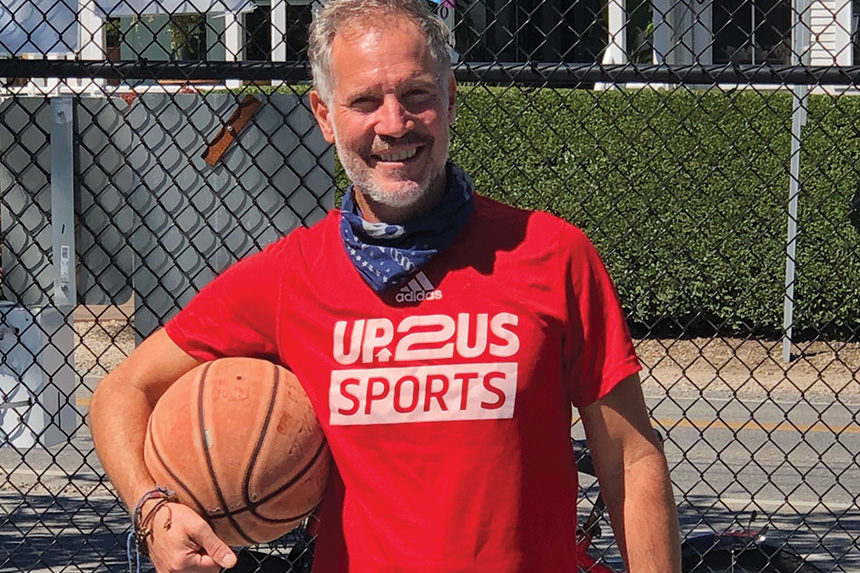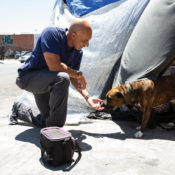Paul Caccamo loves telling a story about a boxing coach in Chicago. One of the coach’s boxers was arrested on a drug charge and sentenced to a few months in a juvenile facility. The coach was devastated but sent the young man letters saying, You can overcome this. You’re better than this. When the teen was released, he immediately walked five miles to the boxing program and asked to re-enroll. When asked why, he said the coach was the first person who believed in him. The young man not only returned to the sport, but straightened his life out and eventually went to college.
“When someone feels cared about, you can change the entire direction of their life,” says Caccamo, the founder and CEO of Up2Us Sports (up2us.org), which trains young adults to be coaches in low-income communities. “Coaches go the extra mile to say, ‘Regardless of what happens on this field, on this court, in this ice hockey rink, I care. And I’m going to care tomorrow, and I’m going to care next week.’ And when a kid hears that over and over again, it’s amazing how it changes their view of themselves.”
The coaches trained by Up2Us aren’t simply blowing whistles and leading drills. They’re serving as role models and mentors, helping youngsters to excel not only in athletics but in academics — and in life. Since founding Up2Us Sports in 2010, Caccamo and his organization have placed nearly 3,000 coaches across 471 organizations in 18 states and Washington, D.C., serving more than 630,000 young people in 28 different sports.
“Coaches go the extra mile to say, ‘Regardless of what happens on this field, on this court, in this ice hockey rink, I care.’”
Seventy percent of the coaches serve in the neighborhoods they come from, says Caccamo: “I want to get people within the community and give them leadership skills and workforce development skills, so they can be the kind of role models where kids say, ‘Wow! You had the same experience, the same school, the same neighborhood, the same challenges with violence and gangs, and you did this? I want to do it too.’ It’s a powerful model.”
There’s the example of Tiffany Corselli, who grew up in Yonkers and, by age 15, had endured homelessness and the loss of family members. Then she discovered a passion for basketball, inspired by a coach who would wake her up daily at 4 a.m. for practice and made sure she was ready for school by 7:30. Her skill and passion for the sport led to a college scholarship and ultimately a master’s in business management. To repay the debt, today she volunteers as a coach in the Bronx, where, in 2019, she was named Up2Us’s coach of the year. “There is no better feeling than when you see a child who doesn’t like to engage with others become a social butterfly,” she says.
While Caccamo enjoys raving about Up2Us coaches like Corselli, remarkably, he’s not a passionate sports fan. His mother, who grew up poor in South Philadelphia before moving to Long Island, was more interested in exposing her seven sons to Mozart than Mickey Mantle. On days off from school, she would pack bag lunches and take her brood of boys to Manhattan for a dollop of culture, whether they liked it or not. Caccamo remembers a trip to hear an opera. The unruly brothers were firing spitballs at each other until a woman turned around and said to his mother, “Can you control those kids?”
The woman was Jackie Onassis. And yes, John-John was with her, too.
“My mother was in tears for months,” Caccamo says with a laugh.
Throughout his childhood, his mother repeatedly told him, “I want you to see the world.” He ultimately did, though for unexpected reasons. As a senior at Georgetown University, Caccamo, who was student body president, hosted a large graduation party. It got noisy enough that the police were called. As Caccamo was being arrested, one sympathetic Jesuit priest asked the cop to let him go, suggesting that Caccamo could do penance by serving at an international Jesuit school.
“I ended up getting a letter from a Marshall Islands priest, and he said, ‘How about coming here and running my school with me?’” Caccamo says.
The experience transformed him. “It was the first time I was ever submerged into a culture and community that was completely different than my own,” he says. “I learned that human bonds and relationships are the same everywhere.”
It also made him reexamine the notion of sending outsiders to communities in need. “I went, I did a year of service, I changed my life, and I left,” he says of his Marshall Islands experience. “But how do we change that model around? How do we use our tools to foster the development of communities so they have resources and can develop those teachers?”
The answer, coaching, didn’t come to him right away. Returning to the U.S., Caccamo earned a master’s degree from Harvard and worked for several nonprofits. But while working in Washington, D.C., he learned about Julie Kennedy, a teacher in a low-income neighborhood whose female students were top academic performers. He paid her a visit to discover the secret of her success. Turns out it was soccer. Most of the girls had never seen a soccer ball, but just one day after learning the game, Kennedy found they were more supportive of each other and more focused on what she said.
Kennedy had formed a nonprofit, DC Scores, which runs youth soccer leagues in the city, and the always enthusiastic Caccamo signed on as a minimum-wage employee. He credits that experience for giving him the know-how to launch Up2Us. His many supporters include former NFL commissioner Paul Tagliabue, a fellow Georgetown alum who offered legal and organizational advice. “He’s obviously selfless and deeply committed to serving people who are in need,” says Tagliabue, now a partner in the international law firm Covington & Burling. “It’s like Harry Truman used to say: We can do anything as long as we don’t care who gets the credit. Paul doesn’t care who gets the credit.”
The power of youth sports, Caccamo believes, is that it creates positive peer groups. When he visits sports programs around the country, players frequently tell him that if not for their team, they’d be in a gang. Sports also teaches skills such as critical thinking, decision making, and communication. “Built into sports is the entire game plan for social-emotional learning and well-being,” he says.
After the killing of George Floyd last summer, Caccamo shared a letter on the Up2Us website and quoted Nelson Mandela: “Sports can create hope, where there was once only despair.” As America examines its history of racial injustice, the values taught by coaches — teamwork, self-respect, education — are essential, Caccamo says. Fifty-two percent of Up2Us coaches are African American and 20 percent are Hispanic. Up2Us is training these coaches to be leaders, and when Caccamo inevitably moves on from the organization he founded, his replacement, he says, will be a logical choice: a coach.
Ken Budd is the author of The Voluntourist and the host of 650,000 Hours, an upcoming web series and podcast on travel and real-life American heroes.
This article is featured in the November/December 2020 issue of The Saturday Evening Post. Subscribe to the magazine for more art, inspiring stories, fiction, humor, and features from our archives.
Featured image: The power of love: “When someone feels cared about, you can change the entire direction of their life,” says Caccamo. (Courtesy Up2Us Sports )
Become a Saturday Evening Post member and enjoy unlimited access. Subscribe now



